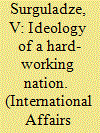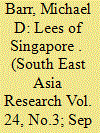| Srl | Item |
| 1 |
ID:
140589


|
|
|
|
|
| Summary/Abstract |
THE GLOBAL ATTENTION to the reforms of the architect of Singapore's "economic miracle" is easily explained by the country's socio-economic successes. Lee Kuan Yew, the first prime minister of Singapore, is an iconic figure in the modern world. In many developing and industrial countries, he is regarded as a true economic and political guru. His book, From Third World to First. The Singapore Story: 1965-2000,1 has deservedly become a handbook for many state leaders.* What kind of a country is Singapore today and why does the experience of this small nation attract the attention of state leaders faced with questions of modernization and successful competition in the global market?
|
|
|
|
|
|
|
|
|
|
|
|
|
|
|
|
| 2 |
ID:
148549


|
|
|
|
|
| Summary/Abstract |
It is no secret that a dynasty has emerged as the ruling force in Singapore. The Lee family (of former Prime Minister Lee Kuan Yew and current Prime Minister Lee Hsien Loong) is referred to as ‘the first family’ as a matter of routine in private conversation, though not usually in public. Power has already passed from father to son and now there is a generation of high-flying grandsons in the wings. This article traces the establishment and consolidation of the Lee dynasty from the point in the early 1980s when Lee Kuan Yew emerged as the centre of all the significant power networks in Singapore, through to the consolidation of power in the hands of his son, Lee Hsien Loong, in 2011. In the process of doing this, it argues that despite official rhetoric that says that the country runs on the talent of the best and most talented men and women in the country, and the closely related myth that professionalism provides the basis of governance, the reality is that of rule by a family-based clique of confidantes and relatives. There is a strong element of reality to both myths, but both elements are ultimately subordinated to and in the service of the forces of consanguineous and personal networks.
|
|
|
|
|
|
|
|
|
|
|
|
|
|
|
|